This Fort Collins church says it's 'saving lives.' The city has deemed it a 'chronic nuisance'
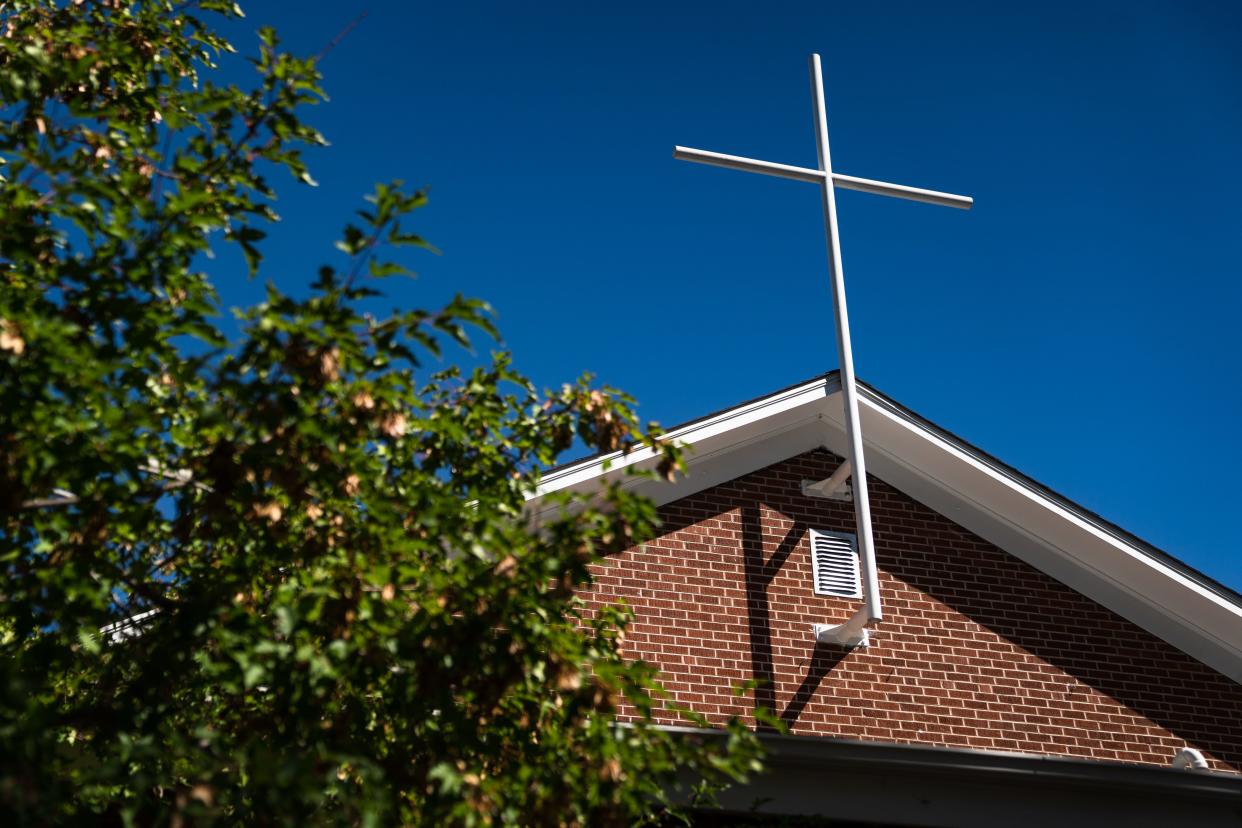
Getting "more difficult properties" to comply with Fort Collins' broadened public nuisance rules has been more successful this year, staff says, thanks to a process that gives them more power in bringing those properties into compliance.
The city's new public nuisance ordinance was unanimously approved by council in December and expanded the definition of "nuisance" to 66 different activities, from overgrown weeds and lawns, excessive trash and inoperable vehicles to activities that were previously defined as police activities, including drug use and assaults.
“It wasn’t covering what people were complaining about,” Fort Collins Neighborhood Services Manager Marcy Yoder said of the previous iteration of the ordinance. "... It didn't really fit for what the needs are currently in the community."
Yoder said the city has been utilizing the chronic nuisance property designation and process outlined in the new ordinance to address properties where city staff see repeated violations.
While the city touts the program's success, one property the Coloradoan confirmed was designated a chronic nuisance property — the Fort Collins Mennonite Fellowship — feels the city's process "threatens all the good stuff we're trying to do," Pastor Steve Ramer said.
What changed when the new public nuisance ordinance was adopted?
A committee made up of individuals from various city departments — including Fort Collins police, code enforcement, building services and occasionally other departments like animal control or parking services — meets twice a month to review properties that have outstanding violations. Sometimes multiple departments are dealing with violations at the same property, and these meetings can lead to more creative and collaborative solutions, Yoder said.
Since the new public nuisance ordinance took effect at the start of 2023, the city has reviewed a total of 35 properties, resulting in:
Voluntary compliance with seven properties after contacting the property owner.
Designating four properties as "chronic nuisance" properties.
Issuing notices to abate public nuisance for two properties.
Continued monitoring of approximately 22 identified properties.
A property can be considered a chronic nuisance property if:
Three or more nuisance activities identified in the code have been reported on the property within 90 days, or seven or more nuisance activities have occurred within one year.
Six or more nuisance activities occur within 90 days or 10 or more nuisance activities occur within one year at properties with multiple residential units under common ownership.
Two or more drug-related nuisance activities occur on the property within 30 days.
There is any nuisance activity on an abandoned property.
Once a property owner is notified that their property is considered a chronic nuisance property, they are asked to work with the city to create an abatement plan to eliminate or reduce the disruptive issues associated with property.
Yoder would not name the four properties designated as chronic nuisance properties, but she did describe the reported violations:
Property 1: A party house with multiple noise violations, nuisance gathering violations and assaults reported.
Property 2: A property that accumulated a lot of stuff on it, including trash and inoperable vehicles, and also had an unmaintained lawn and dilapidated fence.
Property 3: A property with a condemned building on it due to methamphetamine contamination, and “nothing was happening to remediate that,” but there is now a plan to demolish all the buildings on that property.
Property 4: A property police responded to several times for a variety of things. "That is a property that we’re currently working with on an abatement plan to address how do you manage the people who are utilizing your property or that you’re inviting or allowing to be on your property so that the bad behaviors don’t continue to happen," Yoder said.
While the city did not name any of the four identified chronic nuisance properties, the Coloradoan determined through public communications with Fort Collins City Council that the Fort Collins Mennonite Fellowship received a chronic nuisance notice at the end of July. Ramer confirmed this, and based on his description of the reported violations, it was likely "Property 4" that Yoder described.
Ramer said the city cited six instances where police responded to the church's property at 300 Oak St. in a three-month period, which qualifies it under the city's public nuisance code as a chronic nuisance property. Those include:
Arrests of individuals found in possession of drugs or drug paraphernalia and people arrested on outstanding warrants.
An individual was cited for littering because they had trash on the ground around them while sitting in front of the church.
A person on the property who was approached by police fled and was later cited for resisting arrest.
A woman, who Ramer said had known mental health issues, was screaming outside on the property and was cited for disturbing the peace after not quieting down when an officer asked.
"We're being held responsible for other people's behavior that occurs on our property," Ramer said.
Mennonite Fellowship feels it is 'part of the solution': 'Don't punish us for trying'
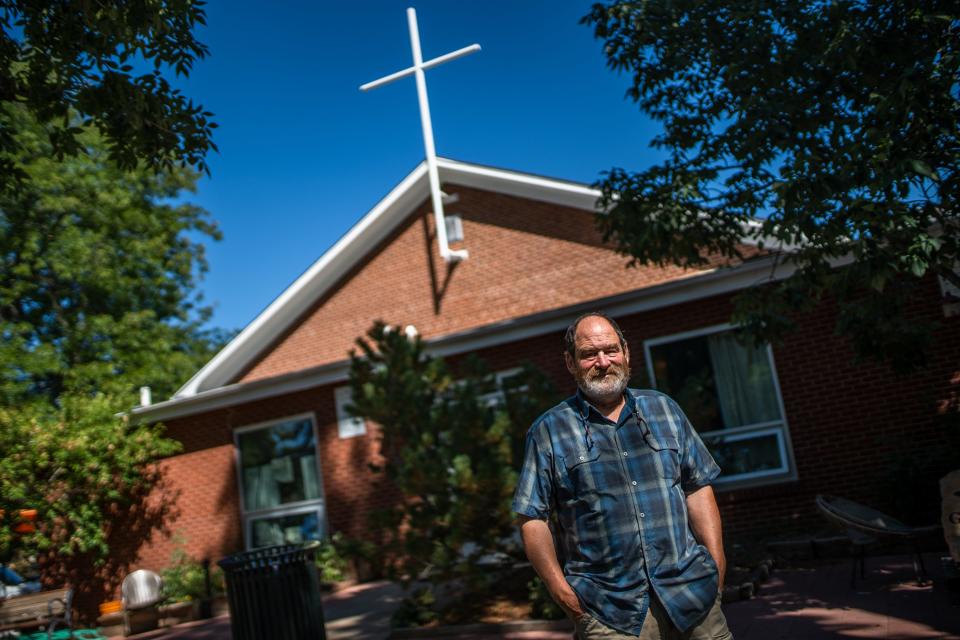
Ramer said the Mennonite Fellowship has been "part of the solution" to homelessness in Fort Collins for more than 30 years, serving meals on days when no other public services are available and even being home to the first cold-weather day shelter in the city before it moved to the Murphy Center.
But in recent years, the church across the street from the Old Town Library has received criticism from some for becoming the site of increased crime and drug use. Neighbors have shared concerns about neighborhood safety issues, drug use and litter associated with the church with Fort Collins City Council and the Coloradoan for years.
Ramer said the church's activities may be viewed as a nuisance to some, "but damn it, we're saving lives."
During the COVID-19 pandemic, the church paused in-person services. Since they weren't using the sanctuary, Ramer said they were able to convert much of the building to living spaces to house several older women who had health issues and were considered high-risk for becoming seriously ill from COVID-19.
Since then, those women have left and now the church houses a different population: Young men recovering from substance addiction.
Alec Zaidi said he didn't have anywhere to go after being released from prison in November, and his friends who were already living at the church at the time invited him to move in there, which he did in February.
"People around here do care," Zaidi said. "... It's provided stability, it's provided accountability as well. ... It was like a puzzle piece, like I just fit here."
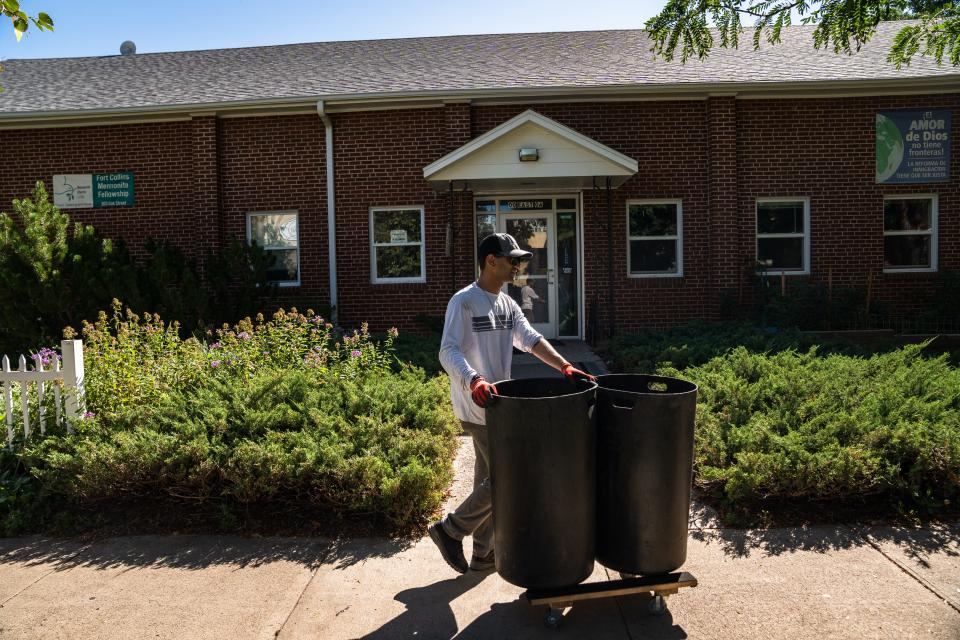
Zaidi is one of about eight or nine young men who are sober and in recovery living in the church, Ramer said, but other people in similar situations often come by the church for support or resources — to do laundry or take a shower — or to spend a night or a few if they need to: People like Charlee Ashlock, who stopped by the church the morning of Aug. 31, the day after being released from 64 days in inpatient substance abuse treatment.
“It’s a place where I know I can feel safe for at least a night or five minutes, or someone to talk to or a shoulder, or if I just need some Jesus,” Ashlock said.
Ashlock said the people at the Mennonite Fellowship have been a reliable support system for him as he's tried to get and stay sober, but the drug use that occurs outside the building can be really triggering for him — so much so that he didn't come back to the church for six months last year because he was in recovery and couldn't risk seeing people using drugs and relapsing.
“We know for some, drug use is a really big concern,” Ramer said. “It is for us, too.”
“We understand that the people who are trying to stay clean and sober inside also can’t get triggered, so we do not condone, nor do we encourage, nor do we want drug activity and drugs on our property. So we don’t want it and are very active in getting rid of it.”
But Ramer said arresting or citing people caught with drugs on church property does not stop the behavior, they just do it somewhere else. Providing resources for people using drugs and dealing with substance abuse issues, like establishing a safe injection site, would be much for effective than continued police responses to the church, Ramer suggested.
“If they really wanted to do something about drugs in the city, then do something that works.”
Ramer said many of the people who are now sober and living at the church were once the people using drugs or causing disturbances outside on the church's property, and forging relationships and being a safe space has helped save lives.
“We’re not a provider, we’re a church, and all we're trying to do is show what we believe Jesus asked us to show. And Jesus said, ‘Welcome the poor,' " Ramer said. "... I feel like we're part of the solution. Don't punish us for trying."
Chronic nuisance designation 'a punch in the gut' for Mennonite Fellowship
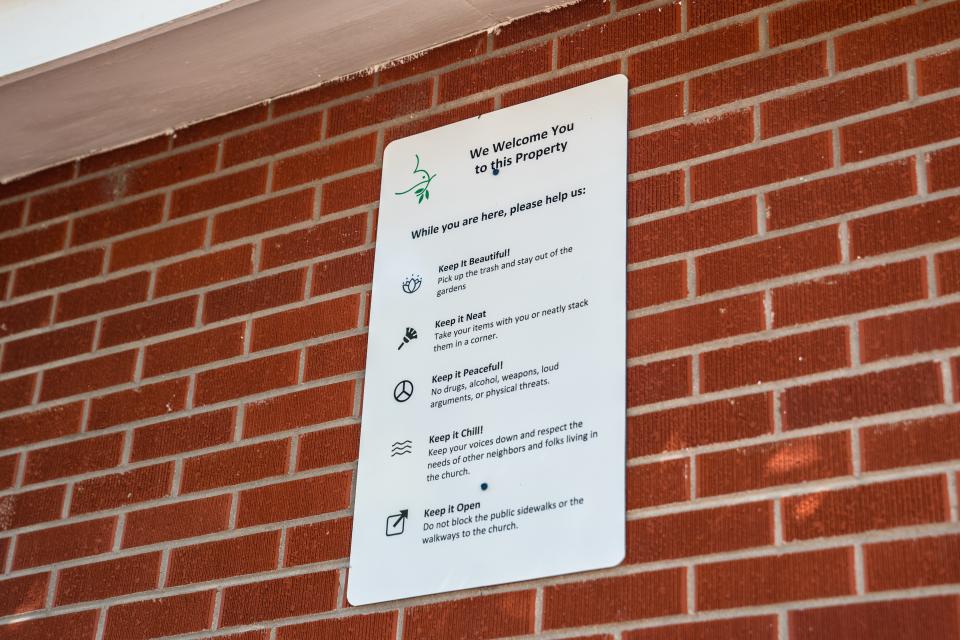
In the church's abatement plan submitted to the city at the end of August and shared with the Coloradoan by Ramer, the church outlines ways it plans to address multiple behavior violations, including the following:
Drug use, weapons possession and violent behaviors will not be tolerated, and violators will be asked to immediately leave the property.
Unreasonable noise will not be tolerated, and people will be asked to immediately quiet down or leave the property.
Those found littering will be asked to place trash in the bins provided by the church.
Unattended personal items will be removed within 24 hours. (Note: The church does have limited lockers available for people experiencing homelessness to store their belongings.)
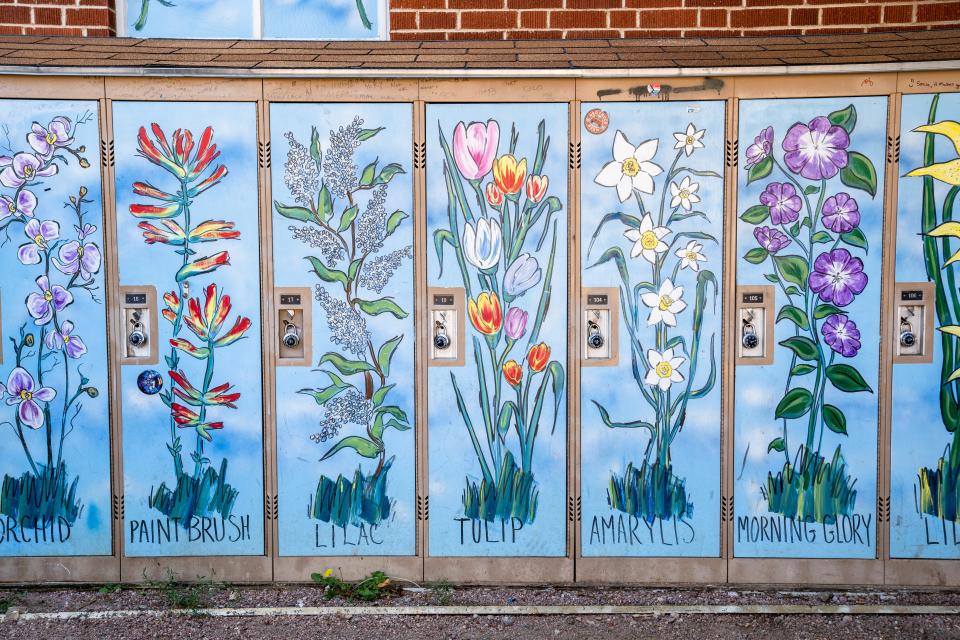
The church's plan also notes ongoing actions they are taking to "improve relationships with neighbors and the city," including posting a code of conduct those on the property must follow, installing a landline phone so those at the church can be promptly notified about concerning behaviors and enforcing a 9 p.m. curfew and instructing people to leave the property by that time.
Ramer said he feels good about the plan and believes it addresses the violations outlined by the city, but he's still unsure if it's exactly what the city is looking for.
Receiving the chronic nuisance notice has caused a lot of anxiety, Ramer said, and it is still unclear to him exactly what needs to be done to ensure the church isn't penalized with a fine or with a lien being placed on the church's property and potentially losing the building.
“It just felt like a bit of a punch in the gut from the city to sort of say, ‘We’re going to threaten you with maybe taking your building from you, or at least fine you a whole bunch of money,’ " Ramer said. “... It threatens all the good stuff we’re trying to do here without acknowledging the positives."
City after compliance, not punishment
If the code violations at the church or any of the other chronic nuisance properties aren't addressed, possible penalties include fines or jail time, up to having a lien be placed on the property, according to the code. But Yoder said penalizing property owners isn't the point of the ordinance.
“What we’re after is compliance — we don’t just want to write a bunch of citations or fines or penalties,” Yoder said. “We want those property owners to work with us in order to resolve whatever that issue is that’s creating the nuisance. And this has been way more effective than anything we’ve had for these more difficult properties.”
Two of the properties the city is currently working with on violations — again, Yoder would not specify which and did not say if they were among the four chronic nuisance properties — are properties the city has been trying to bring into compliance since Yoder joined the city five years ago, “and now there’s action happening on those properties.”
“We feel like we have more tools to address those issues,” she said.
For more information about the city's public nuisance ordinance — including the full text of the ordinance and a way to contact the city about potential violations — visit fcgov.com/cityattorney/public-nuisance.php.
This article originally appeared on Fort Collins Coloradoan: Fort Collins church called 'chronic nuisance' says it's 'saving lives'

